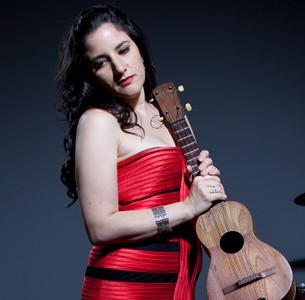
“I was at my friend’s house and i heard a song come on her IPod. It made my body just go crazy, like trembling in the strangest way!” Ani Cordero, singer/songwriter, drummer, founder and leader of indie Latino rock group Cordero and ex-member founder of Pistolera is describing the beginnings of her new project, Recordar, as we caught up her at last year’s World Music Expo in Copenhagen.
After hearing the song that has caused such a physical effect on her, she googled the lyrics only to find out it was “Mi Viejo,” a song by Argentinean Piero, with whom she subsequently became friends. she says, “It was the beginning of a very exciting thing. I’d made several records with Bloodshot [Chicago indie label], but this solo album happened quite by accident.”
Shortly thereafter, she found out that in fact, her mother had played Piero’s record “night and day” when she was little, “I didn’t remember but my body remembered in some sort of way. Those early influences are ingrained in your body. He had been my mom’s favorite artist until I was 5, then we moved to Atlanta and she lost the record in the move:”
That led to a period when Cordero researched music to find other songs that inspired her and had the same kind of impact, Latin American classics from the decades of the 30’s to the 70’. These songs were her parent’s favorites, as well as her grandparent’s, with whom she was also raised. They come from all over Latin America and have a few things in common, including, says Cordero, that: “… to some extent, every artist was affected in some way by political situation or transition from dictatorship to democracy.”
Her selection included several beloved Latin American protest singers such as Chileans Violeta Parra and Victor Jara and Atahualpa Yupanqui from Argentina. “But not all songs are political in an obvious way,” she clarifies, giving the example of “Macorina,” a song whose most definitive version in in the legendary Chavela Vargas’s voice. She made that choice, Cordero says, because: “A love song from a woman to a woman in Chavela’s times – I found that to be so brave. So many of these songs are about being brave.” And of course, she included a song from her own heritage – the Puerto Rican plena, “Choferito.”
What she wanted to do, says Cordero, is to “present this music in a way that showed the common experience of political transitions… my perspective had been like, the Univision perspective, – we are all Latinos, and we are all here – but we know there are differences. I needed to find a way to show how we as Latinos have had a common experience.”
—-
Listen Ani Cordero live at Old Town School of Folk Music October 3.
Check Catalina’s radio show Beat Latino (On FB and itunes too!) as well as recent NPR features to explore the past, present and future of Latin music.
